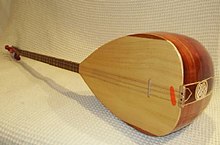Sevdalinka

Sevdalinka is a musical genre and describes the traditional, originally urban love poetry in Bosnia and Herzegovina . It is above all the folk music of the people in Bosnia-Herzegovina. Sevda ( Turkish love , Arabic black bile ) stands for the Bosnian tradition and folklore in general. Similar to the Portuguese Saudade , it should generally describe a melancholy and melancholy mood, which is mostly generated by feelings of love or deep, often unfulfilled passion for a person, city or region. A well-known example of this genre is the melancholy song Moj dilbere . It is an integral part of the Bosniak culture .
The history of Sevdalinka goes back to the 16th century. In the Ottoman Empire there was first the solo , later the accompaniment by saz , accordion , violin , tambourine and guitar .
The Sevdalinka were also influenced by the music of the Sinti and Roma , such as the Gypsy scale . Sevdalinka is of great cultural importance in Bosnia-Herzegovina , Croatia , Montenegro and Serbia .
Well-known performers were Safet Isović , Meho Puzić , Silvana Armenulić , Nada Mamula and Zaim Imamović . Nationally known is z. B. the Mostar Sevdah Reunion .
Other well-known Sevdalinka singers
Beba Selimović, Emina Zecaj, Zora Dubljevic, Fatima Kadrić, Hasiba Agić, Himzo Polovina, Kadira Cano, Meho Puzić, Hamid Ragipovic-Besko, Nusreta Kobić, Midheta Handukić ( Emina and many others), Husein Kurtović ( Ne klepecić ), Omer Nanul Pobrići Zehra Deović , Jozo Penava, Hasim Muharemović, Muhamed Mešanović, Slobodan Lalić, Nedžad Salković, Husein Kurtagić, Mira Torbica, Muhamed Pašić MASURA, Hanka Paldum , Rešad Bešlagić, Radmila Jagodić, Merima Njegomir , Selim Salihović, Zekerijah Đezić, Fatima Kadrić and Nedeljko Bilkić .
Texts
The poems of poets such as Safet beg Bašagić , Aleksa Šantić and Musa Cazim Catić were sung as Sevdalinka.
Well-known Sevdalinka songs
- Ah moj Aljo
- Anadolka
- Bosno moja divna mila
- Čije je ono djevojče
- Čudna jada od Mostara grada
- Da zna zora
- Došla voda (Mejra)
- Emina
- Evo ovu rumen ružu
- Iziđider, Fato
- Yes zagrizoh šareniku jabuku
- Jutros mi je ruža procvjetala
- Kad ja podjoh na Bentbašu (Flute) (Guitar)
- Konja kuje Dizdarević Meho
- Kujundzija besjedio
- Mila majko šalji me na vodu
- Moj dilbere
- Mujo gleda u mahali
- U lijepom starom gradu Višegradu
- Ne klepeći nanulama
- Oj Safete sajo, Sarajlijo
- Šehidski Rastanak
- Što te nema ( why aren't you here? )
- S one strane plive
- U Stambolu na Bosforu ( In Istanbul on the Bosphorus )
- Zapjevala sojka ptica
- Zaplakala stara majka ( The old mother cried )
- Žute dunje (Voljelo se dvoje mladih)
- Zvjezda tjera Mjeseca ( The star follows the moon )
Sevdalinka songs / recent performers
- Divanhana (Album: Zukva , Release Date: 2016 Label: ARC)
- Amira Medunjanin (album: Rosa , 2005, it was recorded with Mostar Sevdah Reunion)
- Mostar Sevdah Reunion (The first album - 1999)
- Božo Vrećo (albums: Moj Sevdah , 2014, Pandora , 2017 and Melek , 2018)
- Halka (albums: Halka , 2013 and O Ljubavi , 2014)
Discography
- Mujo kuje konja po mjesecu - Zaim Imamović
- Sarajevo, divno mjesto - Himzo Polovina
- Sevdah i suze - Himzo Polovina
- Sevdalinke (1999) - Silvana Armenulić
- Iz Kulturne Baštine BiH 1 (2001) - Hanka Paldum i Sejo Pitic
- Vječne Sevdalinke (2001) - Behka i Ljuca uz saz
- Traditional Bosnian Songs (2002) - Emina Zecaj i sazlija Mehmed Gribajčević
- Molila Se Žuta Dunja (2002) - Ibro Selmanović
- Legenda o Bosni (2003) - Safet Isović
- Izabrane Sevdalinke 1 and 2 - Safet Isović
- Amanet (2003) - Ibrica Jusić
- Noć Sevdaha (2003) - Fatima Kadrić
- A Secret Gate (2003) - Mostar Sevdah Reunion
- Pjesme u srcu i duši desetogodišnje djevojčice (2005) - Alma Subašić
- Wiener Tschuschenkapelle & Jovica Petković / Bosanske Sevdalinke, 2006, published by Extraplatte
Web links
- sevdalinke.com (English)
- mostarsevdahreunion.com (English)
- institutsevdaha.ba (Bosnian only)
- bosnaprkosnaodsna (MP3 download; only in Bosnian language)
- bosnafolk.com (PDF; 1.73 MB)
- klingende-bruecke.de
Individual evidence
- ↑ worldofsevdah.com (English) accessed on December 11, 2010
- ^ Women in the Ottoman Balkans: Gender, Culture and History. . 2007, p. 80.
- ↑ Divanhana. Retrieved August 17, 2017 (American English).
- ↑ Amira Medunjanin. Retrieved March 25, 2017 (American English).
- ↑ Bozo Vreco: "Sadness is better than love" . In: derStandard.at . ( derstandard.at [accessed on March 25, 2017]).
- ↑ Halka. Retrieved March 25, 2017 (English).